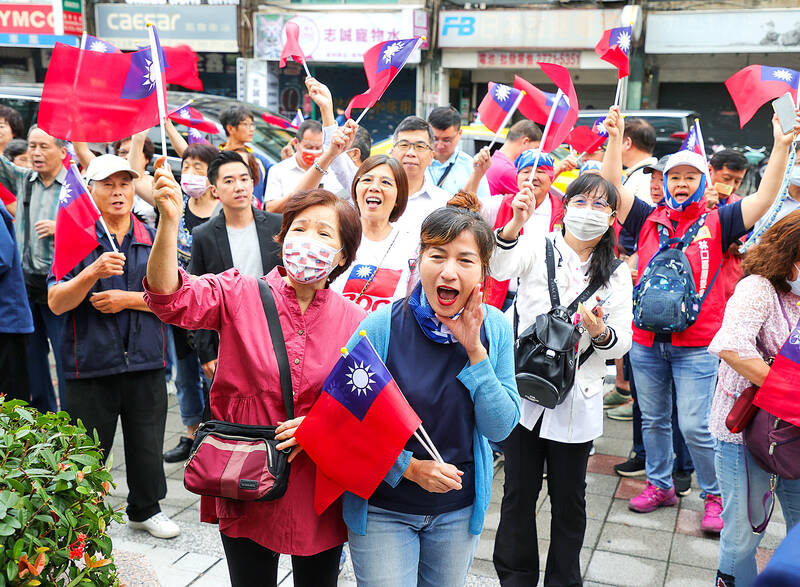Chinese Nationalist Party (KMT) Chairman Eric Chu (朱立倫) at the KMT’s separate flag-raising event for the Double Ten National Day yesterday said that the Democratic Progressive Party (DPP) was sowing ideological division in the nation.
He made the remark hours before President William Lai (賴清德) called for unity in his National Day presidential address.
Former president Ma Ying-jeou (馬英九) and KMT lawmakers occupying leadership positions in the party were seen attending the KMT event instead of partaking in the official ceremony.

Photo: CNA
“The Republic of China [ROC] was created by Sun Yat-sen (孫中山) 113 years ago, who led the revolution alongside sages and saints,” Chu said.
“The KMT forever stands with the people in defense of the ROC and Taiwan’s economic development, peace and democracy,” Chu added.
The KMT supports all bills and budget proposals beneficial to Taiwanese and national security, as the party is pursuing legislative reform and aims to broaden local governments’ self-ruling powers, especially in fiscal matters, he said.

Photo: CNA
“The party stands firmly in support of cross-strait peace and economic advancement on the path of peace,” the KMT chairman said, adding that peace underpins the party’s commitment to the so-called “1992 consensus” and the Constitution.
The so-called “1992 consensus” is a term former Mainland Affairs Council chairman Su Chi (蘇起) in 2006 admitted making up in 2000. It refers to a tacit understanding between the KMT and the Chinese government that both sides of the Taiwan Strait acknowledge there is “one China,” with each side having its own interpretation of what “China” means.
“It is a shame that Lai’s presidency so far has shown that strife is the only word in his dictionary,” Chu said.
The DPP’s “prejudiced ideology” is to blame for the strife in the Taiwan Strait and Taiwanese government, he added.
The DPP must cross the political divide by giving up its ideological positions, he said.
In the 21st century, the DPP should give up its steadfast support for Taiwanese independence, and opposition to nuclear energy and the death penalty,” Chu said.
“Taiwanese independence is a dead end,” he added.
Ma said that he declined to attend the official National Day ceremony in protest of the president’s stance on the nation’s sovereignty.
There are no two nations across the Taiwan Strait, but there are two areas that can coexist in peace, Ma said, adding that Lai’s new “two states theory” has branded the president a “troublemaker” in international eyes.
At a separate event, Taiwan Statebuilding Party Chairman Wang Hsing-huan (王興煥) slammed Lai’s endorsement of the ROC name as leading the Taiwanese independence movement into “a dead end.”
The government should handle the ROC national identity with care in its bid to capture political capital, lest it allows the enemy to set definitions for itself, he added.
Taiwan should seize the opportunity created by the particular conditions of international society to escape the ideological framework from the conflict between the two Chinas, National Taiwan University history professor Chou Wan-yao (周婉窈) said.
To identify with the ROC or the People’s Republic of China is to endorse China’s so-called unification and Taiwan’s disappearance as an entity, Chou said.
Meanwhile, the Taiwan People’s Party (TPP) in a statement said that Lai is coming to the realization that the people are above partisan interests and that the president should practice unity by working with the opposition.

Chinese Nationalist Party (KMT) Chairman Eric Chu (朱立倫), spokeswoman Yang Chih-yu (楊智伃) and Legislator Hsieh Lung-chieh (謝龍介) would be summoned by police for questioning for leading an illegal assembly on Thursday evening last week, Minister of the Interior Liu Shyh-fang (劉世芳) said today. The three KMT officials led an assembly outside the Taipei City Prosecutors’ Office, a restricted area where public assembly is not allowed, protesting the questioning of several KMT staff and searches of KMT headquarters and offices in a recall petition forgery case. Chu, Yang and Hsieh are all suspected of contravening the Assembly and Parade Act (集會遊行法) by holding

PRAISE: Japanese visitor Takashi Kubota said the Taiwanese temple architecture images showcased in the AI Art Gallery were the most impressive displays he saw Taiwan does not have an official pavilion at the World Expo in Osaka, Japan, because of its diplomatic predicament, but the government-backed Tech World pavilion is drawing interest with its unique recreations of works by Taiwanese artists. The pavilion features an artificial intelligence (AI)-based art gallery showcasing works of famous Taiwanese artists from the Japanese colonial period using innovative technologies. Among its main simulated displays are Eastern gouache paintings by Chen Chin (陳進), Lin Yu-shan (林玉山) and Kuo Hsueh-hu (郭雪湖), who were the three young Taiwanese painters selected for the East Asian Painting exhibition in 1927. Gouache is a water-based

Taiwan would welcome the return of Honduras as a diplomatic ally if its next president decides to make such a move, Minister of Foreign Affairs Lin Chia-lung (林佳龍) said yesterday. “Of course, we would welcome Honduras if they want to restore diplomatic ties with Taiwan after their elections,” Lin said at a meeting of the legislature’s Foreign Affairs and National Defense Committee, when asked to comment on statements made by two of the three Honduran presidential candidates during the presidential campaign in the Central American country. Taiwan is paying close attention to the region as a whole in the wake of a

OFF-TARGET: More than 30,000 participants were expected to take part in the Games next month, but only 6,550 foreign and 19,400 Taiwanese athletes have registered Taipei city councilors yesterday blasted the organizers of next month’s World Masters Games over sudden timetable and venue changes, which they said have caused thousands of participants to back out of the international sporting event, among other organizational issues. They also cited visa delays and political interference by China as reasons many foreign athletes are requesting refunds for the event, to be held from May 17 to 30. Jointly organized by the Taipei and New Taipei City governments, the games have been rocked by numerous controversies since preparations began in 2020. Taipei City Councilor Lin Yen-feng (林延鳳) said yesterday that new measures by